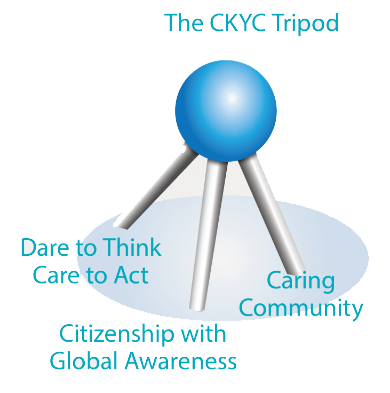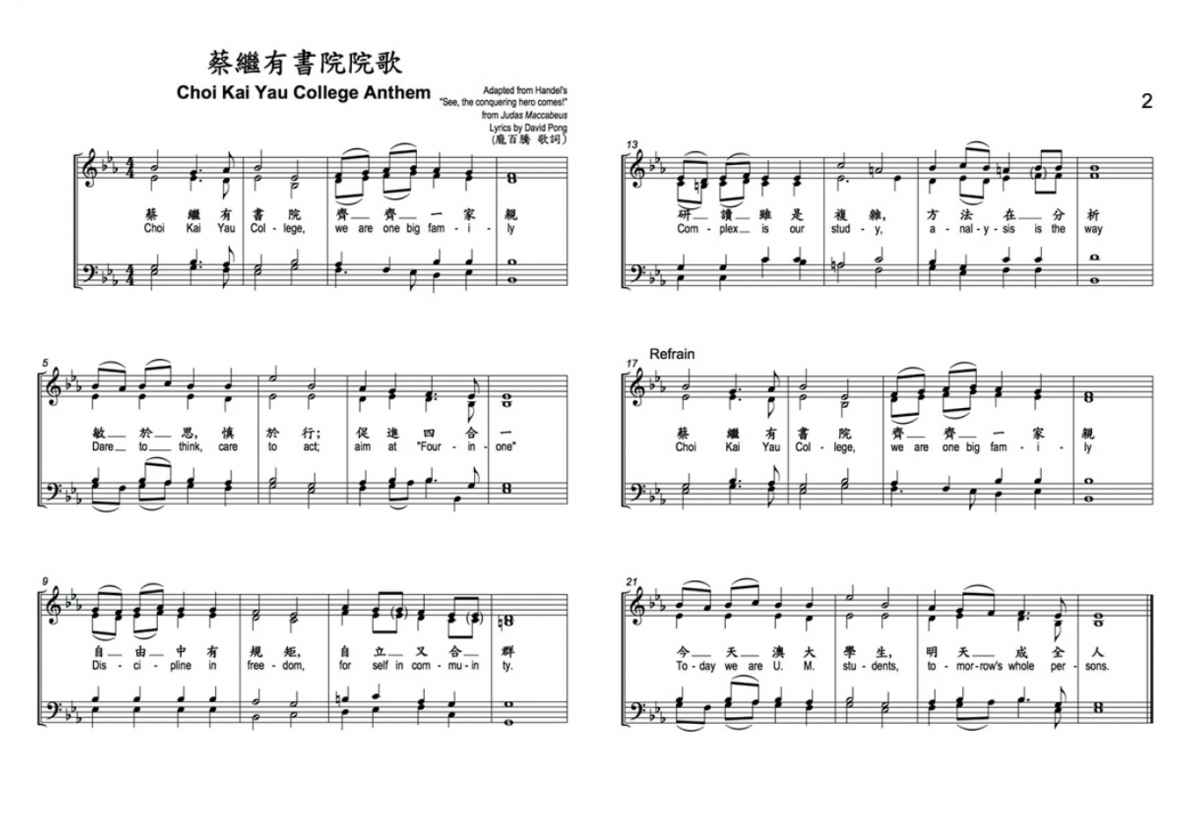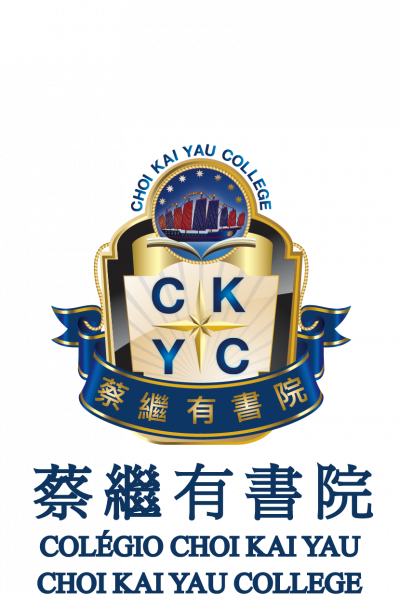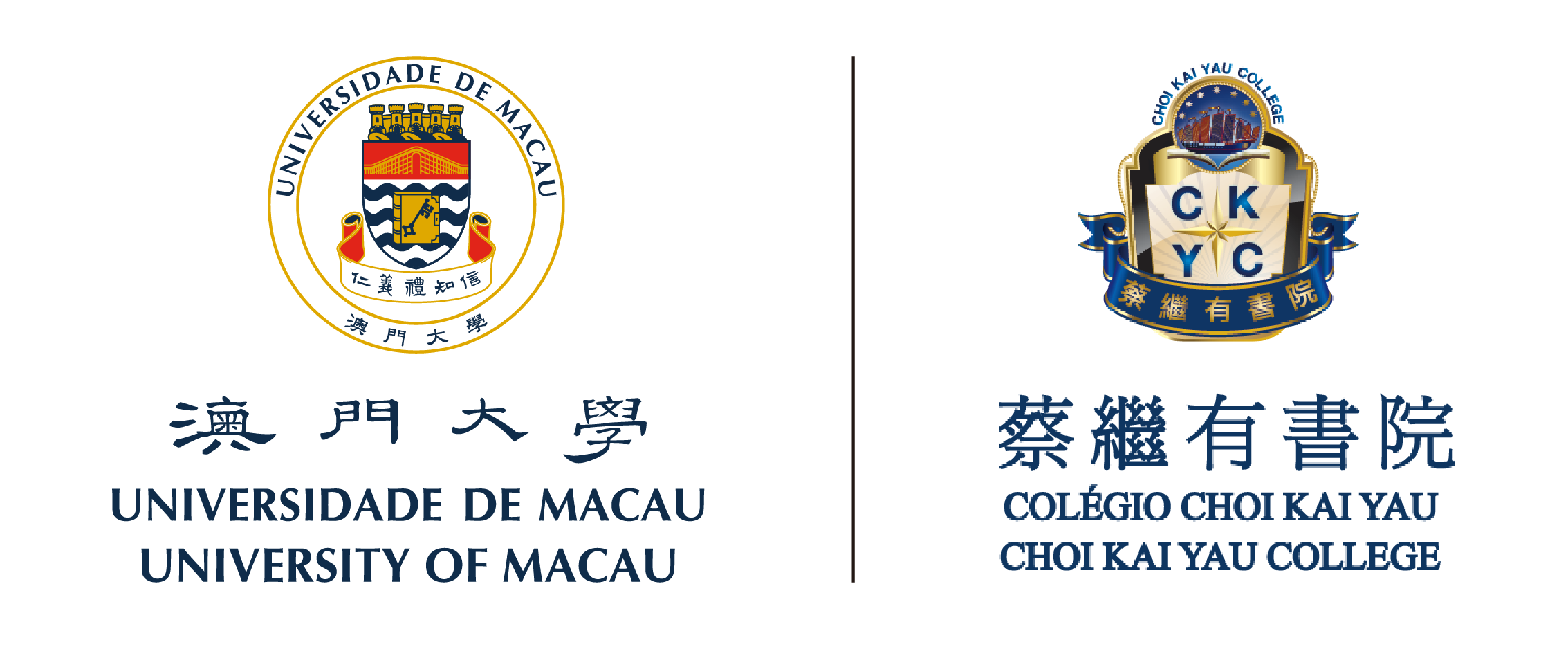Goal, Theme and the CKYC Tripod
~Prof. David Pong, Founding Master
The Residential College System of the University of Macau provides in each of the colleges an environment for whole-person education. Choi Kai Yau College (CKYC) is no exception. But like all the other residential colleges, we also have our own character, goals and themes. Our overall goal is to empower you by challenging you to think, and then translate your thoughts into action, hence our motto: Dare to Think; Care to Act. Within this larger goal, we also have a theme, which is centred around globalization and citizenship with a keen awareness of global issues. We then undergird these goal and theme with a strong sense of humanity. We want to create within the walls of CKYC a caring community. Not only shall we care for each other, for our private quarters as well as public areas of the College, but also for all the things that we do. In this way, as we are encouraged and emboldened to think creatively, critically, and analytically — we are both careful and caring enough to put our thoughts into action for the betterment of ourselves as persons, our College, our University, our homeland and the world.
Therefore, CKYC is built on the tripod of “Dare to Think; Care to Act”, “Citizenship with Global Awareness”, and a “Caring Community”, for Macau and the world.
I. Dare to Think; Care to Act
This motto is pretty catchy, but it embodies more challenges than you may think. Thinking is a personal exercise. If one simply follows what other people think, one is not thinking! Thinking for oneself, i.e., independent thinking, often requires courage, because what one thinks may not agree with what other people think, or what they want you to think!
Thinking, however, is not fantasizing or dreaming. Young people have dreams, naturally, and even older people, too. But when brought down to earth, one should apply rigour, discipline, and analysis to thinking. The conclusions must be tested, and endlessly reflected upon. “Is this the right way to think about this or that?” This is the question we should be constantly asking ourselves. “Dare to Think” therefore has two meanings: (1) To have the courage to think independently and to admit that one may have been thinking along the wrong lines, and (2) To see thinking as a challenge.
Thinking without action can become somewhat empty or abstract. For the most part, and for most of us, we want to translate our thoughts into action. This motto insists on the unity of thought and action. If one is constantly checking whether one is thinking along the right lines, the actions that follow are likely to be beneficial. Indeed, if the thoughts have been repeatedly checked and reflected upon, one should have an interest in putting them into action: “Care to Act”. To stretch its meaning a little, “Care to Act” is also a call on you to care for yourselves as individuals and for the environment in which you live as you get on with your studies and your life.

II. Citizenship with Global Awareness
Globalization means different things to different people. Some think it is good because, for one, goods and services have become more easily available, and possibly cheaper as well. In other words, they have become more accessible. Some think it is not so good because, for example, local cultures in many parts of the world are disappearing because powerful, global forces have overwhelmed them. The popularity of ‘fast foods’ from the West has caused serious health problems, and many fine local cuisines have suffered. Some languages spoken by small communities have actually vanished. Good or bad, though, globalization is here to stay. We cannot escape from it; we live in a world of interdependence. As thinking persons, we should be aware of the forces that are impacting us on an individual level as well as on a societal level. This way, we will be better situated to benefit from the good things that globalization brings and minimize its ills.
III. Caring Community
An essential function of a residential college is pastoral care. The term brings up an image of a shepherd herding his or her flock of sheep grazing in the pastures. As you might have guessed, this picture of a shepherd caring for his or her sheep has a Christian origin, although now widely accepted by other religions and non-religious organizations. In university and college communities, this often means looking after the personal and social wellbeing of students, including their health, social and moral education. We want to do all of these in CKYC, to ensure that you have a healthy environment in which to grow and develop into a whole person.
Pastoral care, however, can be a little too passive. It implies that the shepherd (or the Master of the College and the staff) is doing all the caring. A truly caring community is one in which all the members actively participate. We should care for each other. This also means that we should be receptive, if not grateful, when others show their care for us. We should also care for the environment because we all live in it, and depend on it for the present and for the future. First up, we should care for the College, the building and its facilities, so that we can use them, just as those who come after us can also use them. We should care for the campus, for Macau, and for Planet Earth.
The CKY Tripod
This CKYC Tripod is one way to bring about a whole-person education. It will help you understand the relationship between your formal studies and your daily life. It will empower you to think critically and analytically. It will clarify for you why and how you want to be part of the community, a caring community, be it Macau or the world.

CKYC College Anthem

The College Crest and Color
The sailing ship suggests that life and the search for knowledge are a journey across the oceans, but the ocean, in this case, is an open book, a symbol of knowledge and wisdom.
The ship is a schematic rendition of the famous treasure ship of Zheng He, the Chinese admiral and diplomat, who led seven expeditionary voyages in 1405-1433 reaching as far as the east coast of Africa, nearly a century before Vasco da Gama. This suggests not only globalization but also globalization as a Chinese tradition.
The seven stars represent the seven continents, suggesting inclusiveness and global awareness.
The star in the middle is the North Star; just as the ship reaches out to the world, the North Star provides bearing for the ship. The North Star represents the collective wisdom of the staff and the students, who, through constant interaction, provide the guiding light for whole-person education.
Sky Blue is the College colour. Set against the crest mantle’s darker blue of the deep blue sea and the rays from the sun depicted in the shield, the possibilities are boundless.


